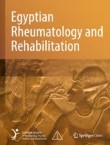Evidence-based medicine is “the conscientious, explicit, and judicious use of current best evidence in making decisions about the care of individual patients” (Sacket et al., 1996). Evidence-based clinical practice integrates the clinician’s expertise, research evidence, the expertise of the clinician, and the patients’ values when making decisions for the care of the individual patient. Over the past two decades, rheumatology has joined the move towards evidence-based medicine aiming at meeting the needs of the patients living with arthritic conditions.
In the same vein, Egyptian Rheumatology and Rehabilitation (ERAR) has endorsed the publication of evidence-based guidelines/treatment recommendations as the gold standard for clinical practice.
The Editors of ERAR are glad to put this call for articles for this thematic series which will be dedicated to continue working to establish the criteria for the most common rheumatic diseases. The aim is to enhance patients’ management in a specific clinical setting, implement the recently available evidence to optimize patients’ management and achieve the treatment targets.
The Clinical, Evidence-based, Guidelines (CEG) initiative launched by the Egyptian Academy of Rheumatology has published a protocol. The activity involves a qualitative synthesis of scientific evidence and consensus, based on the existing scientific evidence and clinical experience. The protocol, which was approved the local ethical committee, adopted the Patient/Population, Intervention, Comparison, Outcomes and Time (PICOT) approach. This was the cornerstone to develop an up-to-date gold standard for consensus, evidence-based, clinical practice guidelines for treatment of rheumatic diseases. These guidelines were tested meticulously by Egyptian expert clinicians.
The high levels of consensus achieved, as well as the agreement with the most recently published treatment recommendations; meanwhile, meeting the Egyptian standards for the available financial resources made this work a trustable and valuable source for patient care in Egypt.
This series is open to all research centres (including rheumatological scientific societies in Egypt and other relevant societies) on each of the topics listed below:
• Rheumatoid arthritis
• Systemic lupus erythematosus
• Lupus nephritis
• Kawasaki Disease
• Osteoarthritis knee
• Bechet’s Disease
• Ankylosing spondylitis
• Vasculitis
Timeline
We encourage submissions for this call from now until the end of 2022. Please indicate in the cover letter that the submission is in response to this call. Submitted manuscripts will receive expedited handling with quicker turnaround to final decisions than normal manuscript submissions. The journal submission guidelines can be found here.
All submitted manuscripts will be subject to peer review and the usual journal editorial policies. You will need to selection the ‘TS: Evidence-Based Egyptian Clinical Practice: Treat to Treat Guidelines for Rheumatic Diseases’ collection in Editorial Manager when submitting your manuscript.
See the article collection here.
Reference:
Sackett DL, Rosenberg WM, Gray JA, Haynes RB, Richardson WS (1996): Evidence based medicine: what it is and what it isn't. BMJ, DOI: 10.1136/312.7023.71.
